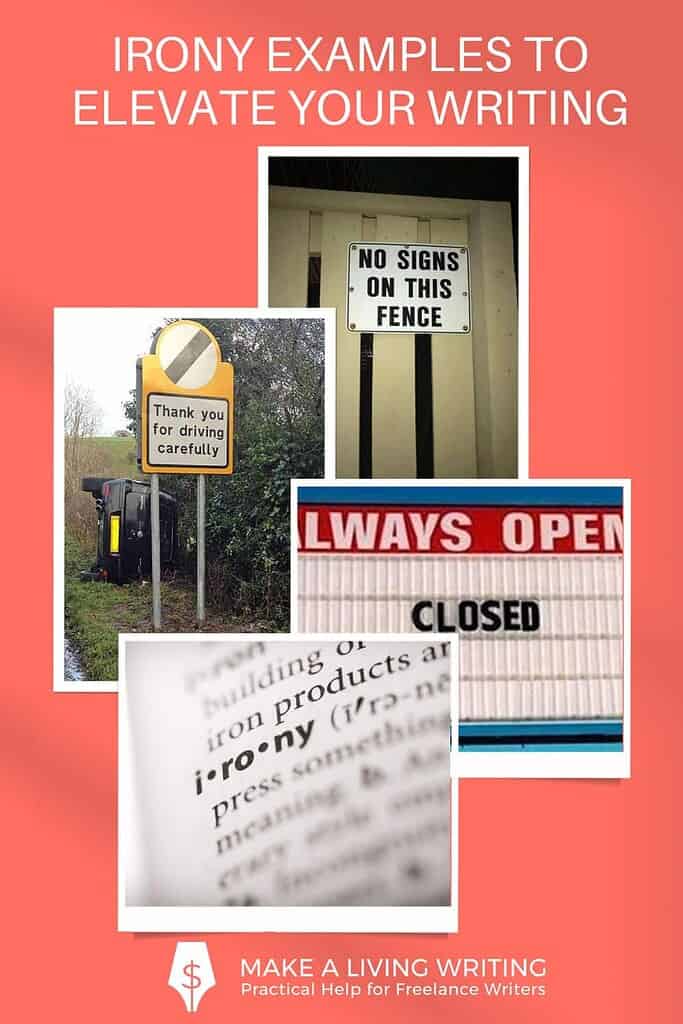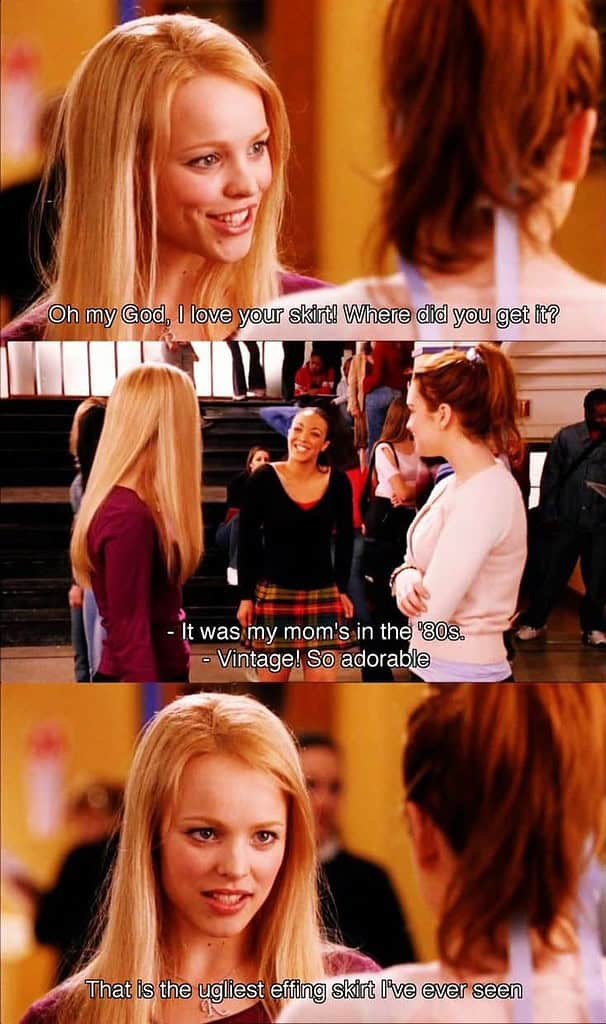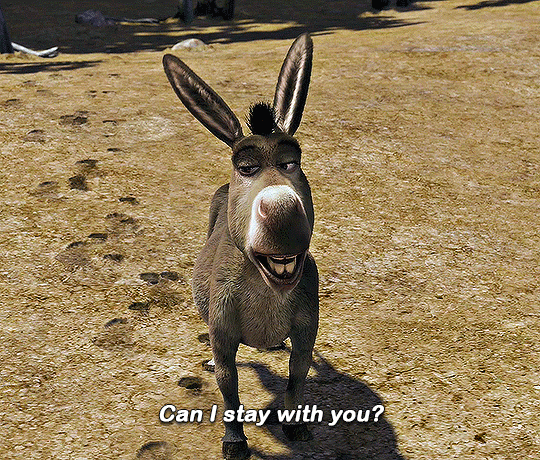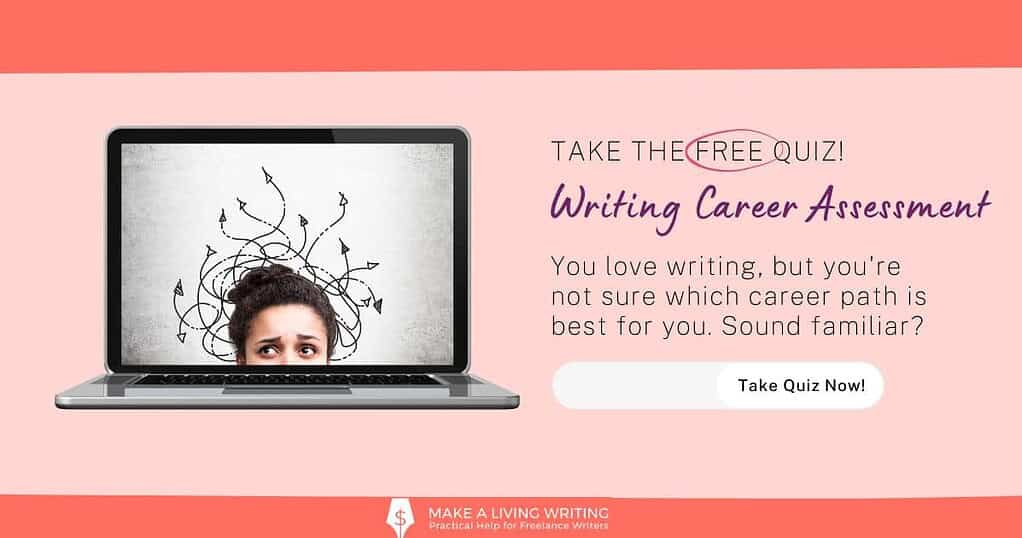A fascinating aspect of the human experience, irony can be likened to a twist of fate, an unexpected detour, a curve ball, a plot twist, a Catch-22, or a paradox. Most people know irony when they see it, but it helps to have irony examples to put words to the literary device.
Irony occurs when something deviates from what is expected, but this term is very commonly misused and misunderstood.
In this article, we’ll look at the three main types of irony, as well as irony examples in film, literature, and real life to help you incorporate it into your own writing
It can be difficult to determine whether or not something is actually ironic or just bad luck. There are three main kinds of irony. Verbal irony, dramatic irony, and situational irony.
Verbal irony
Verbal irony is a figure of speech where what is said is opposite to what is meant. This type of irony is often used rhetorically and can be used to convey humor, sarcasm, frustration, or anger. It relies heavily on context, tone, and delivery to signal the reader or listener that the speaker’s true intent is the opposite of what is presented.
Verbal irony examples
- Understatement: Describing something as much smaller, less important, or valuable than it really is. Example: Saying, “It’s a little windy out” during a Category 5 hurricane
- Litotes: A type of understatement that emphasizes a certain quality by negating the opposite. Example: “The casserole is not bad”
- Double entendre: When a phrase has a double meaning, often used to subtly share inappropriate jokes that younger readers or viewers will not understand but adult audiences will find amusing. Example: Saying “You look so hot” to someone who is sweating
Dramatic irony
Dramatic irony occurs when the audience knows something the characters do not. This form of irony creates tension, suspense, or humor to engage the audience and add depth to the story.
Dramatic irony examples
- Tragic irony: When the audience knows that something bad is going to happen to the character while they remain unaware. Example: The audience sees a dangerous criminal go down an alley and the character walks the same way without seeing them
- Comic irony: When what the audience knows but the character does not lead to something amusing. Example: In the show Jury Duty, a cast of actors set up a fake trial, judge, and jury. One juror, Ronald, is the only one who is not an actor and thinks it is a real trial
Situational irony
The most common type of irony is situational irony. With situational irony, what happens is the opposite of what is expected. These ironic plot twists create amusement, surprise, or tragic twists of fate.
Examples of situational irony
- Karma/Poetic justice: When a character unexpectedly receives a fitting consequence. Example: When the wicked prison warden in The Shawshank Redemption is outed for his financial crimes by the falsely imprisoned and recently escaped Andy Dufresne
- Fateful twist: Something that happens by chance in a strange, interesting, or unfortunate way. Example: The inventor of the Segway actually died in a Segway accident
- Role reversal: When a character finds themselves in a role opposite to what is expected Example: In Dreamwork’s Megamind, the evil Megamind created a new superhero, Titan, so he would have someone to challenge him, but Titan turned evil and Megamind had to become the good guy to defeat him and save the city

Irony examples in film and literature
*spoiler alerts!*
The Twilight Zone S1 E8: Time Enough at Last
In this episode of The Twilight Zone (my personal favorite), a bank teller who wants nothing except time to read in peace accidentally escapes a nuclear war in the bank vault and emerges into an empty world. All that is left standing is the public library with enough books and canned food to last him a lifetime. Just as he settles in for a peaceful life of reading, he bends over to pick up his first novel, his glasses fall off his face and shatter. He now, ironically, has all the time in the world but can never read again. This is situational irony.
Harry Potter
There are many instances of irony throughout the Harry Potter series. Harry believes for so long that he must kill Voldemort to save himself and the wizarding world only to find out that he is the final horcrux and must let Voldemort kill him instead. Ironically, Lord Voldemort does not know that in trying to kill Harry as a baby he turned him into the seventh horcrux and that him now killing Harry will ultimately lead to his demise. This is dramatic irony.
Mean Girls

Regina: Oh my god, I love your skirt! Where did you get it?
Lea: It was my mom’s in the 80s!
Regina: Vintage, so adorable.
Lea: Thanks
(Lea leaves)
Regina: (Turns to Cady) That is the ugliest effing skirt I’ve ever seen.
This is verbal irony.
Les Misérables
When Jean Valjean breaks parole, he is taken in for the night by a humble bishop who gives him food and shelter. While the bishop sleeps, Valjean steals his precious silver candle sticks and flees. Valjean is apprehended and brought back to the bishop’s home, expecting punishment for his crime. The bishop tells the officers there has been a mistake and that he had given Valjean the candle sticks as a gift. The kind bishop tells Valjean to take this gift and use it to become an honest man. This is situational irony.
Seinfeld S6 E7: The Soup
George: “I feel like my old self again. Totally inadequate, completely insecure, paranoid, neurotic… It’s a pleasure.” This is verbal irony.
Tuck Everlasting
The Tuck family accidentally becomes immortal by drinking water from a spring in Treegap, New Hampshire. Over the years a man in a yellow suit catches on to their disposition and wants the power of immortality for himself and to sell it to make a fortune. He tirelessly pursues the Tucks to find the source of the spring and ironically is killed in his quest for immortality. This is situational irony.
The Truman Show
Truman Burbank lives an idyllic life in an idyllic city. Ironically, he is the only one unaware that he is the star of a reality TV show. Everyone he knows is an actor and the city is actually a set on a sound stage. This is dramatic irony.
Shrek

Donkey: Can I stay with you please?
Shrek: Of course!
Donkey: Really?
Shrek: No
This is verbal irony.
Frozen
Olaf the snowman’s favorite season is summer. This is situational irony.
Real-life irony examples
- The “unsinkable” Titanic sank on its first voyage
- Just as the Titanic ignored warnings and sank, over a century later the OceanGate submersible Titan, on its way to the wreckage site, ignored warnings and met the same fate
- Most of the irony examples in Alanis Morrissette’s song “Ironic” aren’t actually ironic
- Doctors promoted cigarettes up until the mid-late 20th century
- Fast and Furious star Paul Walker died in a car crash
- A fire station burning down
- A police station being robbed
- An out-of-shape personal trainer
- A dentist with cavities
- A pilot who is afraid of heights
Irony can elevate your writing by creating layers of complexity that can provoke emotional and intellectual responses from your audience.
Adding irony examples into your writing can not only infuse your stories with humor and suspense, but also shed light on the injustice, absurdity, and hypocrisy of the world around us.
